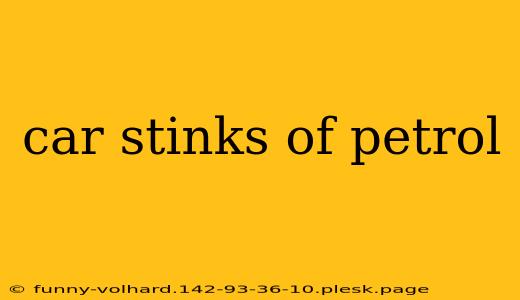A strong petrol smell emanating from your car is never a good sign. It indicates a potential safety hazard and requires immediate attention. Ignoring the issue can lead to serious consequences, from engine damage to a potential fire. This comprehensive guide will explore the common causes of a petrol odor in your vehicle, the inherent dangers, and the steps you should take to resolve the problem.
Common Causes of a Petrol Smell in Your Car
Several factors can contribute to a petrol smell inside your car. Identifying the source is crucial for effective remediation.
1. Leaking Fuel System Components:
- Fuel Injector Leaks: Faulty fuel injectors can spray fuel onto hot engine components, leading to a strong petrol odor. This is a serious issue and requires professional attention.
- Fuel Lines: Cracks or loose connections in the fuel lines can cause fuel leaks, resulting in a noticeable petrol smell. Regular inspection of fuel lines is vital for preventative maintenance.
- Fuel Pump Leaks: A malfunctioning fuel pump can leak fuel, often leading to a strong smell, especially when the engine is running or recently switched off.
- Fuel Tank Leaks: A compromised fuel tank, whether due to corrosion, damage, or manufacturing defects, can result in a significant fuel leak and a pervasive petrol odor. This is a major safety concern and demands immediate professional repair.
2. Fuel Cap Issues:
- Loose or Damaged Fuel Cap: A loose or damaged fuel cap can allow fuel vapors to escape, creating a noticeable petrol smell. Ensure your fuel cap is properly secured after refueling.
- Faulty Evaporative Emission Control System (EVAP): This system prevents fuel vapors from escaping into the atmosphere. A malfunctioning EVAP system can cause fuel vapors to leak, leading to a petrol smell inside the car.
3. Other Potential Sources:
- Spills: Accidental spills during refueling can contribute to a lingering petrol odor. Thorough cleaning is necessary to eliminate the smell.
- Fuel Vapor Accumulation: Even without a leak, fuel vapors can accumulate in the vehicle's interior, especially in hot weather or after prolonged periods of inactivity. Proper ventilation can help mitigate this.
Dangers of a Petrol Smell in Your Car
The smell of petrol is not just unpleasant; it's a serious safety concern. Petrol is highly flammable and its vapors can be explosive. Prolonged exposure to petrol fumes can also lead to health issues.
- Fire Hazard: The most significant danger is the risk of fire. Leaking fuel near hot engine components poses a significant fire risk.
- Health Concerns: Inhaling petrol fumes can cause headaches, dizziness, nausea, and respiratory problems. Long-term exposure can have more serious health consequences.
- Environmental Impact: Leaking fuel contaminates the environment.
Addressing the Petrol Smell: Steps to Take
If you detect a petrol smell in your car, take immediate action.
- Park the Vehicle in a Well-Ventilated Area: Do not leave the car in an enclosed space like a garage.
- Identify the Source: Carefully inspect the fuel system for any visible leaks.
- Do Not Attempt DIY Repairs if Unsure: Unless you have the necessary expertise, attempting complex repairs yourself can be dangerous.
- Seek Professional Help: Contact a qualified mechanic immediately to diagnose and repair the problem. Ignoring the issue could exacerbate the problem and increase the risk of a fire.
- Ventilation: Air out the car thoroughly to dissipate the petrol odor after addressing the leak.
Ignoring a petrol smell in your car is a gamble with potentially catastrophic consequences. Prioritize safety and seek professional assistance as soon as you notice the odor. Regular maintenance and prompt attention to potential problems will help keep you and your vehicle safe.

